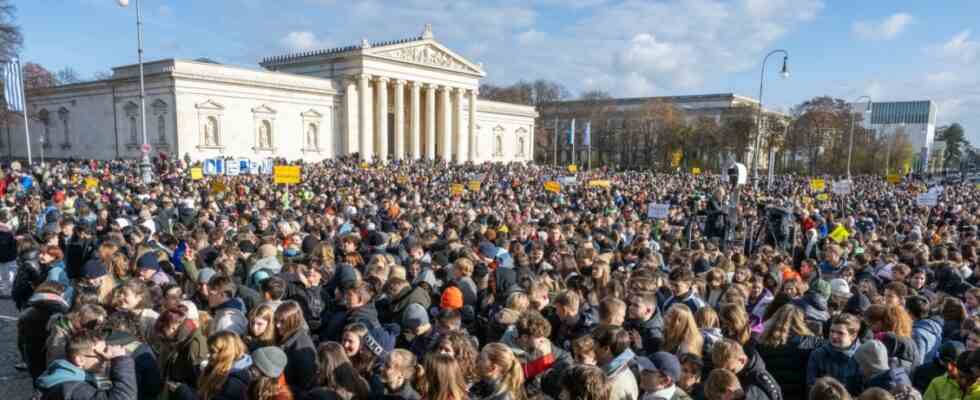“If 20 percent more teachers are employed in state schools, by what percentage must the subsidies for private schools increase?” asks Florian Huber. Instead of raising their fingers in the air, thousands of students pulled out their smartphones on Munich’s Königsplatz on Wednesday and voted live. More than 80 percent press on the hoped-for result: 20 percent, so that the 1,352 private schools in Bavaria can employ 20 percent more teachers. Huber prophesied that students who voted differently would have a “stellar career in the Ministry of Education”.
Fun was allowed at this large demonstration disguised as an open-air math lesson with a party character, to which the Council of Free Schools (RFS) had called. The large private school associations in Bavaria are united in the RFS, and a fifth of the schools in the Free State are independently sponsored. About 200,000 students attend a private school. More than 12,000 of them came to Munich to demonstrate for fairer school financing. According to the RFS, the state government prefers state schools. “It cannot be that a child at private schools gets less money than a child at a state school,” said Peter Kosak, RFS spokesman and director of the Augsburg diocese’s school board. This contradicts the principle of equality in the Basic Law.
According to Kosak and Huber, not only the increased energy costs are an enormous burden for school authorities, which can go so far that schools are closed. In rural areas in particular, private, often church schools take on substitute functions, operating the only specialized or secondary school in the district. The mostly low school fees can hardly buffer rising costs. In 2019, before Corona, the energy costs per student amounted to 103 euros, Kosak calculated. This year it comes to 284 euros – an increase of 180 percent. The state must help.
The factions of the CSU and Free Voters had just announced this help with energy costs via the state government’s hardship fund and an increase in the so-called school fee replacement by 12.8 million euros to a total of 141 million euros. There are also plans to revise the School Financing Act. The fact that the private school associations nevertheless held on to their large-scale demonstration is said to have triggered displeasure in the Ministry of Education and in the factions about the ingratitude of the school authorities.
The deputies at Königsplatz didn’t show anything: representatives of the CSU, Free Voters, Greens and FDP courted the jubilation of the young people. Josef Zellmeier (CSU), the chairman of the budget committee, called the higher subsidies a “first step” and promised quick improvements. Bernhard Pohl (FW) said that the school financing law “must be tackled” before the election. They brought no news with them. Private schools should be “fairly” financed, countered FDP parliamentary group leader Martin Hagen, “that doesn’t change if you now throw out small crumbs as alms.” The situation is as it is because nothing has changed for years, said Anna Schwamberger, spokeswoman for education policy for the Greens. The Free State supports the private schools “strongly”, according to the Ministry of Education. Two billion euros are planned for 2023, “more than ever before”.
At the end of the open-air party math lesson, the private students flocked elatedly towards the main station, the representatives of the school authorities drew a sober conclusion: wait and see what becomes concrete.

